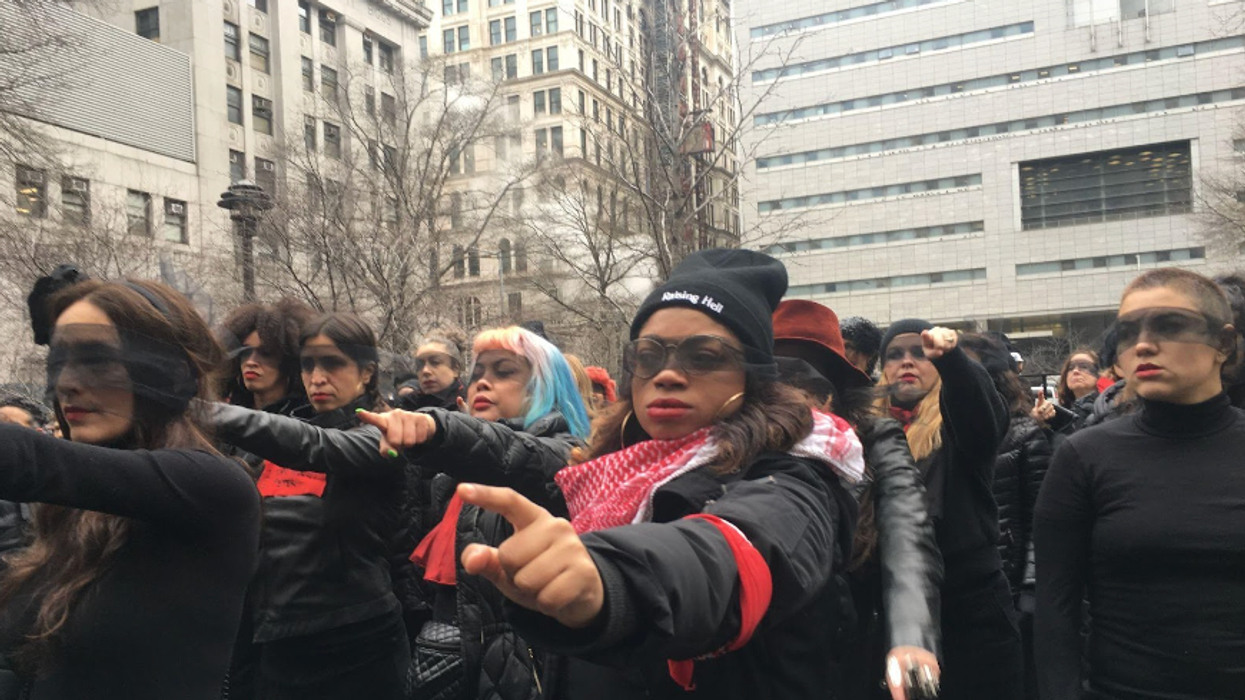On November 5, 2024—the night of the most anticipated election cycle for residents of the United States—thousands gathered around the country, sitting with friends in front of large-screen TVs, optimistic and ready to witness the election of the next president of the United States.
As the hours of election night stretched on and digital state maps turned red or blue with each counted ballot, every 68 seconds a woman was sexually assaulted in the U.S., an estimate calculated by the Rape, Abuse & Incest National Network (RAINN).
Despite this, the result was clear, the majority of U.S. residents chose to elect a leader who has not just boasted about violating women but has actively promoted a system that thrives on silencing, exploiting, and devaluing them.
Deep-rooted rape culture isn’t just thriving—it’s being institutionalized. Survivors are neglected at every turn: untested rape kits gather dust, men accused of sexually violating women rise to power, and even a person found liable in court for sexual assault can be re-elected to the highest office in the land.
Harassing slogans like “ Your Body, My Choice ” continue to mock survivors' pain, while justice remains out of reach for far too many. This isn’t just a failure of the system—it’s an indictment of a culture that prioritizes power over accountability, leaving survivors to go up against a legal system that should instead be accompanying them.
A NATION SILENT AMIDST A SEXUAL VIOLENCE CRISIS
In the weeks following the 2024 election, the President selected five men for senior government positions who have either been accused of rape or sexual misconduct or have been entangled in serious allegations over their mistreatment of women, reflecting a troubling societal acceptance of the disregard for women, their safety, and their rights.
A January 2024 study, published by JAMA Internal Medicine 1, revealed that in the years following the overturn of Roe v. Wade, a Supreme Court decision that stripped women in the U.S. of their Constitutional right to access abortion healthcare, 64,000 pregnancies in 14 U.S. states resulted from rape.
Imagine if this figure is extrapolated to include all 50 states—and what that means about how many rapes are occurring in the U.S. overall? Despite this alarming data, the conversation around sexual violence remains disturbingly muted.
MANY 1000’S OF RAPE KITS LEFT UNTESTED
Meanwhile, hundreds of thousands of rape kits remain untested in evidence rooms across the country, sometimes for decades, each representing a survivor’s harrowing experience. Despite repeated calls for reform, the crisis persists due to a range of issues including inadequate funding, lack of standardized testing protocols, and inaction.
In many cases, untested kits have allowed repeat offenders to remain at large, causing further distress to their victims and putting countless others at risk. This negligence reflects a deeper cultural apathy toward sexual violence, underscoring the urgent need for comprehensive reform and survivor-centered justice.
Sexual violence leaves lasting physical, emotional, and psychological scars. The thousands of untested rape kits and pregnancies resulting from rape are stark examples of a deep-rooted problem. And the same administration that assumes power today is responsible for the repeal of a woman's right to bodily autonomy in the Dobbs decision, resulting in a swath of state-level efforts to outlaw abortion, even in cases of rape. Yet, societal reluctance to confront and address sexual violence perpetuates a cycle of trauma and silence.
OBSTACLES TO JUSTICE FOR RAPE SURVIVORS
Survivors of sexual violence face immense legal obstacles in seeking justice 2, including loopholes in sexual violence laws. From the moment they decide to report the crime, they often encounter institutional misogyny that further compounds their trauma.
Police officers, judges, and prosecutors—key figures in ensuring justice—often display biases and prejudices based on a victim’s sex, gender identity, sexual orientation, race, class, disability, or other personal characteristics. Institutional misogyny reinforces harmful stereotypes, undermining victims’ credibility and dignity. This fosters an environment where survivors feel discouraged from seeking the justice they deserve.
In 2024 alone, numerous examples of legal frameworks and officials allowing perpetrators to go unpunished came to light. For example, Harvey Weinstein's conviction in New York was overturned because judges ruled testimony about his past behavior was inadmissible, even though federal law permits the inclusion of such evidence in sexual violence cases due to the difficulty of proving these crimes.
Additionally, these frameworks often place the burden of providing evidence on the survivor, making the legal process re-traumatizing 3 and one that promotes impunity.
CHANGING HOW CONSENT IS INTERPRETED IN THE LAW
Sex without consent should always be considered rape. International human rights standards 4 define rape as based on the absence of freely given consent, taking into account coercive or exploitative circumstances. This establishes rape as a violation against the right to physical, sexual, and psychological integrity.
According to the Convention on the Elimination of All Forms of Discrimination Against Women (CEDAW) 5 —one of the most widely ratified international treaties, though notably one not ratified by the U.S.—inconsistencies in how rape is legally defined, particularly in regards to what constitutes consent, undermine efforts to effectively protect women and girls from sexual violence.
In some countries, the legal system defines rape as involving the use of physical force 6 and often excludes any other form of coercion or power imbalance between the two parties. These force-based legal definitions of rape allow for certain types of rape to go unpunished and gravely limit the extent to which crimes of rape can be successfully prosecuted.
The United States Department of Justice announced an amendment to the federal definition of rape 7 to include a lack of consent in 2012. This was a very positive step. However, as we’ve seen, even when the law is based on a consent-based definition of rape, stereotypes and rape myths can hinder many prosecutions where additional physical violence was not present. This demonstrates why it is so critical to clarify the law fully and ensure proper implementation.
Among all these obstacles, what remains particularly harmful to survivors is the taboo nature of speaking about rape within many communities. Cultural and social stigmas have prevented countless survivors from seeking the support and justice they need, RAINN estimates that only 310 out of every 1,000 sexual assaults are reported to police. This enables the cycle of violence to continue unchecked.
HOW TO END SEXUAL VIOLENCE
Survivors need comprehensive support systems, including medical care, counseling, and legal assistance. However, support must go beyond immediate aftermaths. We need to create an environment where survivors feel safe to come forward without fear of stigma or retribution. This involves a cultural shift towards unequivocally condemning sexual violence and actively preventing it.
Breaking this cycle requires a concerted effort from all sectors of society, including policymakers, law enforcement, healthcare providers, educators, and the media.
Addressing sexual violence extends beyond supporting survivors; it requires promoting prevention by creating a society of equal respect for each other and for bodily integrity and reforming the criminal justice system to recognize legal gaps and the severity of the issue to protect all women.
If RAINN estimates that 1 in 6 women in the U.S. 8 experience rape or attempted rape during their lifetime, why is sexual violence still a taboo topic and not being addressed as the epidemic that it is? Look around the room at the next large gathering you attend and try to get a sense of what that means.
Then, imagine a world where women and girls don’t have to worry about who is going to assault them and when; a world where they can focus on living their best lives instead of how to protect themselves. No front door keys ready in their hands. No turning down invitations simply because coming home after dark seems too risky. No endless vigilance for threats that shouldn’t exist in the first place.
That world is possible, and it starts with all of us agreeing that sexual violence must end, that it’s not a survivor's fault they were raped, and that our legal system must do more to bring perpetrators to justice, instead of promoting impunity and the cycle of rape as a whole.
Mel Bailey is the Communications Officer for North America and the Ending Sexual Violence global campaign for Equality Now. She is a former international journalist and videographer committed to highlighting how inclusive legislation is key to addressing gender discrimination globally. Twitter: @melb4freepress
1. JAMA Internal Medicine Rape-Related Pregnancies in the 14 US States With Total Abortion Bans https://jamanetwork.com/journals/jamainternalmedicine/article-abstract/2814274
2. Equality Now, Failure to Protect:How Discrimiatory Sexual Violence Laws and Practices are Hurting Women and Girls https://equalitynow.org/resource/failure-to-protect-how-discriminatory-sexual-violence-laws-and-practices-are-hurting-women-girls-and-adolescents-in-the-americas/
3. Columbia Law Review, The Evolution of the Legal Definition of Rape https://www.culawreview.org/journal/the-evolution-of-the-legal-definition-of-rape
4. The Instanbul Convention, Details of Treaty No.210, https://www.coe.int/en/web/conventions/full-list?module=treaty-detail&treatynum=210
5. Rape as a Grave and Systemic Human Rights Violation and GenderBased Violence Against Women, Expert Meeting Group Report https://www.ohchr.org/sites/default/files/Documents/Issues/Women/SR/Call_on_Rape/EGM_EN-SR_Report.pdf
6. Federal Bureau of Investigations - Forceable Rape, https://ucr.fbi.gov/crime-in-the-u.s/2011/crime-in-the-u.s.-2011/violent-crime/forcible-rape#:~:text=Forcible%20rape%2C%20as%20defined%20in,other%20sex%20offenses%20are%20excluded.
7. US Department of Justice, An Updated Definition of Rape, https://www.justice.gov/archives/ovw/blog/updated-definition-rape
8. Rape Abuse & Incest National Network (RAINN), Scope of the Problem: Statistics, How Often Does Sexual Assault Occur in the United States? https://rainn.org/statistics/scope-problem#:~:text=Everyone%20Is%20Affected%20by%20Sexual%20Violence&text=1%20out%20of%20every%206,completed%2C%202.8%25%20attempted).&text=About%203%25%20of%20American%20men,completed%20rape%20in%20their%20lifetime.



















Trump & Hegseth gave Mark Kelly a huge 2028 gift